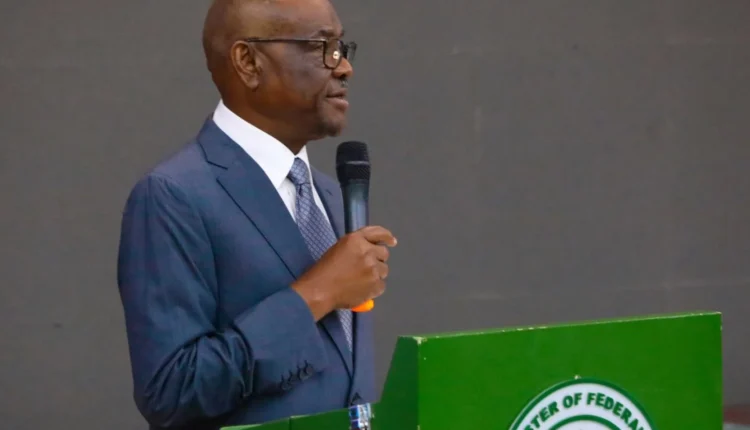Africa can’t talk of devt when leadership is transactional – Wike
Africa can’t talk of devt when leadership is transactional – Wike
The Minister of the Federal Capital Territory (FCT), Nyesom Wike, says
Africa cannot achieve development under a system of “transactional leadership”.
Wike said this while delivering a keynote address titled “Reimagining Africa’s Leadership and Investment” at the 2025 Innovate Africa Conference,on Thursday in Abuja.
He explained that the continent’s persistent underdevelopment,in spite of its vast resources, was a direct consequence of poor governance and self-serving politics.
He lamented that Africa’s leadership trajectory—both in military and civilian dispensations has for decades been shaped by “self-serving conspiracies that bear little or no relation to national interest or development priorities.”
“Africa today stands at a historic crossroads. On one hand, we are blessed with immense natural wealth, youthful energy, and creative potential; yet, we continue to grapple with weak institutions, infrastructural decay, poverty, and widespread unemployment.
“This is the paradox of our age , how can a continent so richly endowed remain so constrained?” he queried.
According to Wike, the decisive factor at the heart of the continent’s paradox lies
in leadership — the kind that defines whether abundance becomes prosperity or stagnation.
“Leadership remains the fulcrum upon which the destinies of nations turn. When leadership is visionary, accountable, and courageous, even the most daunting obstacles can be transformed into opportunities,” he said.
He called for a deliberate shift from “transactional leadership”—which he described as one driven by personal gain, patronage, and short-term calculations to transformational leadership anchored on vision, service, accountability, and courage.
“The time has come to move beyond transactional leadership to embrace transformational governance that empowers rather than exploits, serves rather than rules, and builds rather than blames.”
Wike lamented that Africa’s post-independence experience has largely been one of “groping in the dark,” as many leaders have emerged unprepared for the magnitude of national challenges before them.
“Consequently, we keep experimenting with the fundamentals of development — basic infrastructure, primary healthcare, credible institutions, and functional economies. The result has been decades of missed opportunities,” he added.
Wike urged African leaders to rediscover the ethos of servant-leadership, noting that true leadership is defined by empathy, humility, and a shared sense of responsibility.
“Africa needs servant-leaders — not bosses who command, but mentors who inspire. Leadership is not about power or position; it is about trust, service, and shared purpose,” he said.
Drawing parallels between effective leadership and infrastructural renewal, Wike cited ongoing transformations in Abuja as proof that vision backed by political will can translate aspirations into tangible outcomes.
“In Abuja, we have seen how infrastructural renewal, anchored on commitment and accountability, can redefine a city’s identity and inspire public confidence.
“Roads once impassable now connect communities, and abandoned spaces now thrive with enterprise,” he noted.
Read Also: Kukah Centre, stakeholders strengthen Benue Civil Protection…
Wike also commended President Bola Tinubu’s courageous and reform-driven leadership, especially the removal of fuel subsidy, which he said previous administrations lacked the political will to implement.
He maintained that the president’s efforts to decentralise governance, devolve development through regional commissions, and strengthen security institutions were laying the foundation for national transformation.
“Tinubu demonstrated uncommon courage by confronting Nigeria’s toughest challenge — subsidy removal — a decision that is already yielding dividends in increased revenue for development and economic stability,” Wike said.
He urged African governments to prioritise infrastructure as the bedrock of sustainable development, arguing that “roads, power, and digital connectivity are the arteries through which development flows.”
Wike identified the African Continental Free Trade Area (AfCFTA) as a key instrument for the continent’s economic rebirth, describing it as “Africa’s second liberation the liberation of its economy.”
He explained that AfCFTA was not just a trade agreement; but also a declaration that Africa would no longer be a supplier of raw materials and a dumping ground for finished goods but a cornerstone of the continent’s collective prosperity.
The minister challenged African leaders and citizens to act with urgency and conviction.
“Africa’s future will not be given to us; we must build it. History will not remember what we merely dreamed for Africa, but what we did for Africa,” he said.
“Let us lead differently, invest boldly, and believe radically in the limitless potential of our continent. The time is now. The place is here. The responsibility is ours and the future, unambiguously, belongs to Africa.”

